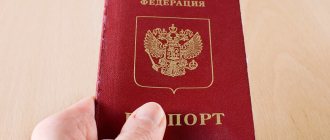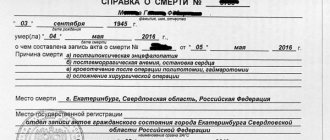In what cases does the law require obtaining the consent of the owner for registration at the place of residence?
To register an individual at the place of residence, it is necessary to submit the following set of documentation to the passport service of the Ministry of Internal Affairs (clause 49 of the administrative regulations, approved by order of the Ministry of Internal Affairs of Russia dated December 31, 2017 No. 984, hereinafter referred to as Regulation No. 984):
- Identity document.
- Application for registration (more details about it are described in our article at the link Application for registration at the place of residence - sample).
- A document that serves as the basis for moving into this living space. Such documentation, for example, includes a title document for the relevant property (certificate of ownership or an extract from the Unified State Register), a court decision, etc.
- Consent of the person/persons who provided this living space to the applicant (i.e., permission from the owner of such living space).
Thus, the consent of the owner refers to mandatory documentation, without which the procedure for registering a person in a residential premises cannot be carried out. Although there are exceptions to this rule, which we will discuss in the next subsection of our article.
When it is not necessary to obtain consent from the apartment owner
Obtaining consent from the owner of the apartment to register a citizen there is not required in the situations listed below:
- Registration of persons belonging to indigenous peoples leading a nomadic/semi-nomadic lifestyle is carried out. The procedure is carried out without obtaining the consent of the apartment owner due to the peculiarities of the lifestyle of these citizens (clause 26(1) of the registration rules, approved by Decree of the Government of the Russian Federation of July 17, 1995 No. 713, hereinafter referred to as Rule No. 713, clause 51 of Regulation 84).
- Registration at the place of residence of persons under the age of 14 years and living with their parents or other legal representatives (clause 28 of rules No. 713). This is described in more detail in the article Registration of minor children at the place of residence of their parents. It is necessary to register at the place of residence of a minor citizen who has already reached the age of 14 years, separately from his legal representatives, in accordance with the general procedure (including with the consent of the owner of the relevant residential premises).
IMPORTANT! According to the explanations of the law enforcement officer, a family member of the tenant/owner of a residential premises has the right to move his minor children into this premises even without the consent of the tenant/owner of such premises (clause 12 of the resolution of the Plenum of the Armed Forces of the Russian Federation dated July 2, 2009 No. 14). Moreover, in practice, moving in in this case means not only actual moving in, but also registration at the place of residence (for example, the decision of the Alushta City Court of the Republic of Crimea dated June 15, 2017 in case No. 2-606/2017).
Is it possible to register children without the permission of the owners?
Typically, the law requires consent from the property owner as a basis for registration. But for a number of citizens special regulation is established
.
This category includes children under the age of majority
.
Therefore,
to the question of whether it is possible to register a child without the consent of the owner, the answer will be positive .
To obtain the right to live together with your parents (parent, other person replacing him), you do not need to obtain permission from the owners. Also, when a child moves in, the rule regarding compliance with the number of living meters per person does not apply.
. Registration of a minor child without the consent of the owner is intended to protect the interests of children, including housing.
However, it should be taken into account that the registration of a newborn child has its own characteristics. In cases where his parents live separately, consent from the other may be required. In this case, the application for registration of a newborn from the mother’s side at her address may not be supported by consent from the father
. In the opposite situation, permission from the child’s mother must be provided.
Sample consent for registration at place of residence
A unified model of such a document has not been approved, so it can be drawn up in free form. Regulation No. 984 establishes only the requirement that such consent must be expressed in writing and certified by a notary or a person accepting documents (clause 49.4 of Regulation No. 984). Consent submitted electronically must be signed with an electronic signature of the owner or contain electronic images of consent certified by the person responsible for accepting documents or a notary (clause 52.3 of regulation No. 984).
In general, the consent structure could be as follows:
- information about the relevant registration authority, i.e. the territorial agency of the Ministry of Internal Affairs of the Russian Federation, clause 2 of rules No. 713;
- information about the owner of the residential premises providing the consent in question: full name, passport details, date and place of birth, registration address;
- information about the residential premises: type (apartment, house, room), address;
- information about documents certifying ownership of such premises;
- information about the person who is given consent to register in this premises: full name, passport details, date and place of birth;
- expressed consent of the owner of the residential premises to register the specified person there;
- date of drawing up the consent;
- owner's signature.
If the apartment is owned by several persons, consent must be obtained from each of them. Such consent is required when persons move into an apartment provided under a rental agreement (clause 94.4 of regulation No. 984).
So, consent from the owner of the living space to register another person at the residence address is included in the set of documents required to be submitted to the regulatory authority when carrying out this procedure. This document is not required only when registering in the same residential premises a newborn or other minors under 14 years of age living together with any of the legal representatives.
When is permission from the owner required for registration?
The only person who has the unlimited right to use, dispose of, and live in housing is its owner. Other persons may reside (stay) in the apartment only by agreement with him.
The law does not limit the circle of persons to whom the owners give permission for registration. These may not be relatives or acquaintances, but complete strangers.
If you wish, you can even register a foreign citizen at your residence address. It is no secret that granting the right of residence to persons who came from other regions in search of a better life has become a way for many to earn extra money
.
Registration can be either temporary or permanent
. In order to be able to use the living space, you need to obtain permission from its owner.
The parties to these relationships independently choose the type of accounting and type of registration that suits them. If the relationship between the parties is not close, it is more appropriate to raise the issue of temporary registration (registration at the place of stay) for a certain time. It gives the right to use housing for up to six months.
It is important to remember that when an apartment is jointly owned by several persons, consent from each of them is required for occupancy. But if there is an allocated share, which is a separate premises suitable for living, then one of the co-owners can register a tenant there himself.
An exception to the general rule is the registration of a child without the consent of the owner.
Moving citizens into residential premises
The content of the article
Guided by current legislation, namely Art. 679 of the Civil Code of the Russian Federation, citizens who permanently reside with the landlord can be moved into this residential premises. The condition for their move-in will be obtaining the consent of the landlord, tenant, as well as citizens who permanently reside in the shared residential premises. Also, when moving in, you should take into account the area standards per person in a residential property.
When moving minor children into the residential premises
consent for their move-in is not required. Compliance with the living space standards per resident is not required when moving in children under the age of majority.
Sometimes it is necessary to give permission for citizens to temporarily move into residential premises. The period of temporary residence of such citizens cannot be more than six months. The law establishes that after this period, temporary residents are required to vacate the premises within seven days. This provision is indicated by Art. 680 Civil Code of the Russian Federation.
Note!
Temporary accommodation of citizens is conditioned by the presence of a set of legal facts such as the consent of the tenant and, at the same time, the consent of the co-users of this residential premises. Mandatory compliance with legislation regarding established requirements for compliance with space standards should also be taken into account.
When moving in temporarily, citizens must notify the landlord. The landlord has the right to either allow or refuse to move in free of charge. If the request to move in is satisfied, a social rental agreement is concluded with temporary residents. In accordance with Part 12 of Art. 155 of the Housing Code of the Russian Federation, temporary residents are required to pay for utilities.
This is important to know: Until what year has the privatization of dacha and garden plots been extended?
Compilation rules
By virtue of Order of the Federal Migration Service of the Russian Federation No. 288, in order to register both at the place of permanent residence and temporary residence, a certain package of documents approved by the specified act is required.
In particular, 25.1 requires:
- an application of the established form with a request for registration, signed by both the citizen himself and the owners of the apartment;
- passport of the person being moved in;
- consent of the apartment owner;
- permission to move in from other adults who are already registered in the residential premises as family members.
It is worth noting that the application with a request for registration has a prescribed form in accordance with the regulations, but there is no consent from the owner, which is why the specified document is drawn up in any form , but in compliance with the basic requirements for documentation of this type.
Content
In fact, drawing up a consent to move in an additional tenant is not difficult, since the specified document contains only basic data .
So the permission structure consists of the following components:
- Headings, which include: the name of the institution where registration is being processed;
- the surname and initials of the owner, as well as his residential address;
- passport details.
By the way, there are no particular differences between permission from the owner for permanent residence and temporary registration for more than three months, so you can use the same form. Although when writing an application, in order to avoid misunderstandings between the parties, you can indicate that consent was received specifically for temporary registration.
Moreover, if there are other residents , written consent from them will also be required in accordance with clause 25.1 of Order No. 288. Moreover, this consent can be formalized according to the sample presented above, taking into account that the law only requires confirmation of the voluntary will of citizens to move in, and not compliance with a multi-level procedure.
I would like to note another important aspect of registration, which is the personal presence of the owner at the same passport office or MFC. The fact is that the written consent of the owner, as well as his relatives, to move in can be obtained at home, and then handed over to the indicated institutions without them.
But an application in the established form with a request for registration, by virtue of Order No. 288, must contain both the signature of the citizen being moved in and the owner of the apartment, and the authenticity of the signature is certified by the employee who accepts the documents. That is, when submitting consent, the presence of the owner and his family is not required, but for the application it is necessary.
Move-in and registration of citizens
Control over compliance with the rules of registration at the place of residence of citizens within the Russian Federation is entrusted to the internal affairs bodies. According to established norms and rules, registration of a citizen of the Russian Federation at the place of residence is carried out without deregistration at the place of residence.
Note!
Citizens of the Russian Federation, in the event of a change of residence, undertake to register their new location within seven days. When registering at your place of stay (vacation, sanatorium, etc.), you are allowed to stay for 90 days without registration.
What documents will be required
An application for registration at the place of residence is submitted in the prescribed form with the following documents attached:
- passport of a citizen of the Russian Federation or identification document of a citizen;
- a document confirming the basis for moving in: a written statement of the person (persons) who provided the citizen with residential premises, a social tenancy agreement, a certificate of state registration of ownership of residential premises, a court decision recognizing the right to use residential premises or another document confirming such a right.
Application for granting the right of residence on behalf of the person providing the citizen with residential premises
The consent of the owners for temporary registration (at the place of residence), as well as for permanent registration (at the place of residence), must be formalized accordingly, in accordance with the sample application (see below). You can find a form for the corresponding document at any migration service or other registration authority. In such a form you need to enter information about the owner of the property, the future tenant, and the address at which registration is required.
In addition, it expresses the voluntary desire of the owner of the apartment (other housing) to grant another person the right to stay or reside in it. Usually, the presence of both the person registering and the person presenting him with such an opportunity is required.
However, there are cases when the owner(s) cannot be present in person. In this case, the application of the person who provided the citizen with residential premises can be submitted by the tenant himself, provided he has a completed power of attorney. Notarization allows you to eliminate various types of fraudulent activities.
Sample
At this link you can (form) consent for registration from the owner.
The general rules of registration legislation state the need to obtain permission from the owners to stay (reside) in their apartment (other housing). Such consent must be expressed voluntarily and documented in the prescribed form.
.
However, exceptions are provided to protect the rights of individuals
. First of all, this applies to minors.
- Is permission required and in what cases?
- Requirements for the owner's application for registration at the place of residence
- Owner's consent to registration: sample filling and nuances when drawing up
- Where and when to submit?
- Rights of a registered person
- Useful video
- Conclusion
Sample application
To apply, you can use the prepared general form and fill it out.
The form is available for downloading and viewing.
Currently, in accordance with the current legislation of the Russian Federation, there is no mandatory application to the territorial body of the Federal Migration Service of the Russian Federation at the previous place of residence with an application for deregistration. De-registration can be completed simultaneously with registration at a new place of residence. However, citizens who have independently de-registered at their previous place of residence have the right to submit documents confirming their departure for registration at a new address, issued by the authority authorized for this action at their previous place of residence.
It is possible not to present a document that is the basis for moving into a residential premises if the information contained in it is at the disposal of state bodies or local governments. In this case, the registration authority independently requests the relevant document (information contained in it), an extract from the relevant register, other information in accordance with the legislation of the Russian Federation from state bodies, local governments and registers the citizen at the place of residence no later than eight working days from the day of his submission of an application for registration at the place of residence and an identity document.
Note!
The application, as well as other necessary documents, can be submitted by electronic means to the registration authority or through a single portal of state and municipal services.
Officials responsible for registration, within three days from the date of application, transfer the citizen’s application and submitted documents, including an identity document, to the registration authority.
The registration authority is obliged to register a citizen at his place of residence no later than 3 days. In this case, a note about registration at the place of residence is made in the passport, and for those who have not previously applied for deregistration at their previous place of residence, a stamp about deregistration at the place of residence and a stamp about registration at the place of residence are simultaneously affixed .
Registration and deregistration of citizens at their place of residence within the Russian Federation is free of charge. Experienced lawyers on our portal will answer your questions and provide you with comprehensive assistance in registering your place of residence as soon as possible. Whether you live in Moscow or another region of Russia, our specialists are ready to provide legal support around the clock.
From whom should I get it?
The nuances of obtaining temporary and permanent registration are prescribed at the legislative level. The norms are noted in the Housing and Civil Codes.
In accordance with the registration stamp, a person can live in the apartment in the same way as in accordance with title documents, a warrant and a certificate of inheritance.
Permission to register must be given by the person who owns the apartment. If the property is private, then there should not be any difficulties. More hassle arises when agreeing on registration in municipal housing. After all, special attention is paid to the number of people living in the premises.
Private square meters can be used in any way you like. But municipal housing is limited by the number of residents. After all, legislatively at the regional level there is a certain norm imposed on each person.
The owner's consent is given in any case. This rule is noted in Article 31 of the Housing Code of the Russian Federation. If there are several owners, each of them must confirm their intention to register the person. If the list of owners includes minors, then the documents are drawn up by their legal representatives.
For private premises, no one other than the owner must give permission. But if the apartment is municipal, then there are more problems.
To obtain a permit you will need the following documents:
- application for the purpose of issuing a permit (form No. 6);
- consent of all persons registered in the premises;
- passports or birth certificates of participants in the procedure to confirm their identity;
- order or social tenancy agreement.
Papers are transmitted through:
- management company;
- Multifunctional center (MFC);
- State Services portal;
- territorial branch of the Federal Migration Service.
It is important that at the time of submitting documents all owners and registered persons are present in the unit.
Sample owner's statement of consent to registration
Consent for temporary residence
Consent for temporary residence. The tenant and citizens permanently residing with him, by common agreement and with prior notice to the landlord, have the right to allow temporary residents (users) to live in residential premises free of charge. The landlord may prohibit the residence of temporary residents if they fail to comply with the requirements of the law on the standard of living space per person. The period of stay of temporary residents cannot exceed six months.
Temporary residents do not have independent rights to use residential premises. The tenant is responsible for their actions to the landlord. Temporary residents are required to vacate the residential premises upon expiration of the period of residence agreed upon with them, and if the period is not agreed upon, no later than seven days from the date of presentation of the corresponding demand by the tenant or any citizen permanently residing with him.
This is important to know: Housing certificate for the purchase of an apartment: obligations
When obtaining consent for residence and registration at the place of residence (permanent), there is no difference where it is drawn up, especially considering that the legislation on issuing residence permits (or on registration) to foreigners does not provide for the execution of any kind of “consent”. We are talking about property, or contracts for sublease, rental, use (free of charge). Which notary certified the consent and in which city does not matter.
In contrast to the norms of the current housing legislation, preliminary notification by permanent users of the landlord of the move-in of temporary residents is introduced. Permission for their move-in and residence is given by the employer and citizens permanently residing with him. The main features of temporary residence are: free use of the premises for a limited period of time - up to six months (which previously had no limit at all), lack of independent right to use the premises.
Although the landlord is only informed by law about the upcoming move-in of temporary residents, he is also given the right to actively prohibit their residence if the standard of living space per person - 12 sq.m. - is violated. Having received such information in advance, the landlord has the right to prevent the entry of temporary residents on this basis. Previous housing legislation also treated temporary residents only as residents. As before, the tenant is responsible for their actions to the landlord, and they are responsible for their actions in housing legal relations only to the tenant.
Within the six-month period of temporary residence, a specific agreed period may be established, after which the temporary resident must vacate the residential premises he occupies. If the period has not been agreed upon at all, the temporary tenant vacates the premises no later than seven days from the date of the tenant's application for vacation. This article does not establish the consequences of an agreed extension of the period of residence of temporary residents beyond six months.




